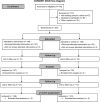Long Term Outcomes of a Geriatric Liaison Intervention in Frail Elderly Cancer Patients
- PMID: 26901417
- PMCID: PMC4762573
- DOI: 10.1371/journal.pone.0143364
Long Term Outcomes of a Geriatric Liaison Intervention in Frail Elderly Cancer Patients
Abstract
Background: The aim of this study was to evaluate the long term effects after discharge of a hospital-based geriatric liaison intervention to prevent postoperative delirium in frail elderly cancer patients treated with an elective surgical procedure for a solid tumour. In addition, the effect of a postoperative delirium on long term outcomes was examined.
Methods: A three month follow-up was performed in participants of the Liaison Intervention in Frail Elderly study, a multicentre, prospective, randomized, controlled trial. Patients were randomized to standard treatment or a geriatric liaison intervention. The intervention consisted of a preoperative geriatric consultation, an individual treatment plan targeted at risk factors for delirium and daily visits by a geriatric nurse during the hospital stay. The long term outcomes included: mortality, rehospitalisation, Activities of Daily Living (ADL) functioning, return to the independent pre-operative living situation, use of supportive care, cognitive functioning and health related quality of life.
Results: Data of 260 patients (intervention n = 127, Control n = 133) were analysed. There were no differences between the intervention group and usual-care group for any of the outcomes three months after discharge. The presence of postoperative delirium was associated with: an increased risk of decline in ADL functioning (OR: 2.65, 95% CI: 1.02-6.88), an increased use of supportive assistance (OR: 2.45, 95% CI: 1.02-5.87) and a decreased chance to return to the independent preoperative living situation (OR: 0.18, 95% CI: 0.07-0.49).
Conclusions: A hospital-based geriatric liaison intervention for the prevention of postoperative delirium in frail elderly cancer patients undergoing elective surgery for a solid tumour did not improve outcomes 3 months after discharge from hospital. The negative effect of a postoperative delirium on late outcome was confirmed.
Trial registration: Nederlands Trial Register, Trial ID NTR 823.
Conflict of interest statement
References
-
- Covinsky KE, Palmer RM, Fortinsky RH, Counsell SR, Stewart AL, Kresevic D, et al. Loss of independence in activities of daily living in older adults hospitalized with medical illnesses: Increased vulnerability with age. J Am Geriatr Soc. 2003; 51: 451–458. - PubMed
-
- Mahoney JE, Sager MA, Jalaluddin M. Use of an ambulation assistive device predicts functional decline associated with hospitalization. J Gerontol A Biol Sci Med Sci. 1999; 54: M83–8. - PubMed
-
- Sager MA, Rudberg MA. Functional decline associated with hospitalization for acute illness. Clin Geriatr Med. 1998; 14: 669–679. - PubMed
Publication types
MeSH terms
Associated data
LinkOut - more resources
Full Text Sources
Other Literature Sources


